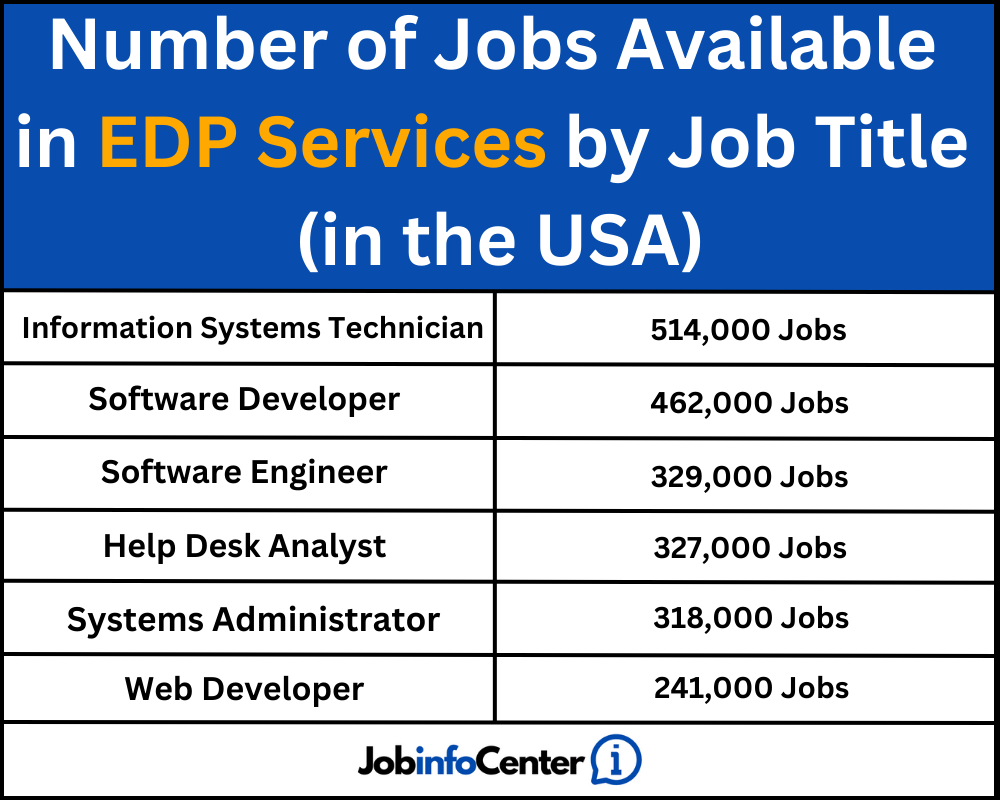The globalized digital era we live in today is intensely data-driven, and businesses heavily rely on data for decision-making. This scenario presents an excellent opportunity for a field like Electronic Data Processing (EDP) services, and consequently, a myriad of job prospects. So, if you find yourself asking “how many jobs are available in EDP services?”, you’re on the right track.
According to the Bureau of Labor Statistics (BLS), there are over 1,200,000 jobs available in EDP services, in the United States.


This article will take you through the career opportunities of electronic data processing, the best paying jobs in EDP services, and the three largest EDP services companies in the US.
What Is An EDP Job?
EDP stands for Electronic Data Processing, a broad term that encompasses the automated handling of data. EDP involves the use of computers and software technology to process, store, and retrieve data efficiently and securely. Professionals in this field work on data collection, conversion, processing, storage, retrieval, communication, and protection.
In an EDP job, you could be a data analyst interpreting complex data sets, a database administrator managing a company’s data infrastructure, or even a cybersecurity expert safeguarding data from potential threats. The roles are as diverse as they are crucial in today’s business landscape.


Is EDP Services a Good Career Path?
There’s no denying that EDP services are a promising career path. As the world leans more into data-driven decision-making, the demand for professionals skilled in EDP is on the rise. Businesses of all sizes and across industries need EDP experts to help them manage and utilize their data effectively.
Moreover, the field offers a wide range of roles, providing opportunities for continual learning and advancement. Whether you’re a fan of number crunching, intrigued by data patterns, or passionate about data security, there’s likely an EDP job that fits your interests and skillset.


Best Paying Jobs in EDP Services
Chief Data Officer (CDO):
The CDO is a C-level executive responsible for enterprise-wide governance and utilization of information as an asset. They usually have a high-level vision for managing and leveraging data in the organization.
The average annual salary for a Chief Data Officer in the United States is around $200,000 per year. However, in larger companies, the salary could be significantly higher, potentially reaching $300,000 or more.
Data Architect:
Tasked with the significant role of designing and managing a firm’s data framework, Data Architects are the architects of the data universe within a company. They mastermind data management systems that amalgamate, centralize, safeguard, and preserve the myriad data sources of an organization.
The average salary for a Data Architect is around $120,000 to $140,000 per year.


Data Engineer:
As the builders and custodians of a company’s data infrastructure, databases, and processing mechanisms, Data Engineers ensure the seamless collection, storage, and retrieval of data. Their role is akin to the engineers of a well-oiled machine, keeping the systems in an optimal working condition.
The average salary for a Data Engineer is around $100,000 to $130,000 per year.
Information Systems Manager:
Wearing many hats, including those of IT managers or IT project managers, these professionals orchestrate and steer all computer-related operations in an organization. Their mission? To help set the IT objectives of a company and bring them to fruition by deploying efficient computer systems.
The average salary for an Information Systems Manager is around $120,000 to $140,000 per year.


Data Scientist:
Donning the hat of a digital detective, Data Scientists employ a blend of scientific techniques, processes, algorithms, and systems to mine insights from both structured and unstructured data. They navigate through complex data landscapes, interpreting them to assist companies in making informed decisions.
The salary for a Data Scientist ranges between $90,000 and $120,000 per year on average, but could be higher depending on experience and qualifications.
Data Analyst:
Data Analysts translate numbers, trends, and trajectories into comprehensible insights to guide business decisions. They manipulate large data sets and use them to identify trends and reach meaningful conclusions.
The average salary for a Data Analyst is around $60,000 to $80,000 per year.


Cybersecurity Expert:
As protectors of information systems from potential attacks, their job roles include encrypting data transmissions and erecting firewalls to conceal confidential information as it is being transmitted and to keep out tainted digital transfers.
Depending on the specific role and level of expertise, a Cybersecurity Expert could earn anywhere from $75,000 to over $120,000 per year.
Database Administrator:
Database Administrators use specialized software to store and organize data, such as financial information and customer shipping records. They make sure that data is available to users and secure from unauthorized access. Database adminstrators can work in a number of different sectors including banking, marine transportation, insurance and electric utilities central.
The average salary for a Database Administrator is around $70,000 to $90,000 per year.


Each of these roles requires a specific set of skills and knowledge base, and the salaries can vary widely depending on the industry, the size of the organization, and the geographical location. But all of them are critical to the functioning of organizations in the digital age.
3 Largest EDP Services Companies in the US
Join me as we delve into the realm of the three leading lights in the U.S. Electronic Data Processing (EDP) services industry. Each of these powerhouses, with their distinctive offerings and capabilities, are instrumental in crafting the digital topography.
IBM
As a pioneer in the tech space, the International Business Machines Corporation, or IBM as it’s popularly known, has left an indelible mark on the EDP services sector. IBM’s unwavering dedication to innovation is truly noteworthy. The company delivers a broad spectrum of services, encompassing data analytics, cloud computing, and cybersecurity. Their solutions are tailored to meet the varied demands of businesses, enabling them to effectively leverage the strength of data.


Microsoft
A name synonymous with technology, Microsoft has carved a significant niche in the EDP sphere. Leveraging its Azure platform, Microsoft offers robust EDP services, propelling data processing capabilities for enterprises of all scales. Furthermore, the firm provides a range of tools for data analysis, machine learning, and artificial intelligence. These advanced tools equip businesses to extract crucial insights from their data, fostering data-driven decision-making.


Oracle
Oracle, celebrated for its database software, is a key contender in the EDP services industry. The company offers end-to-end solutions for managing, processing, and analyzing data. But Oracle’s expertise doesn’t stop at data processing. They also offer tools for data integration, business intelligence, and data security, highlighting their comprehensive approach to EDP services.


To sum up, IBM, Microsoft, and Oracle are the torchbearers of EDP services in the U.S. Each firm, with its specialized bouquet of services, is revolutionizing the way businesses manage and utilize data. As we march towards an increasingly data-centric world, the significance of these companies is poised to grow exponentially.
Conclusion
In conclusion, EDP services continue to exhibit robust growth, providing a wide spectrum of employment opportunities. As we’ve discovered throughout this article, the industry’s dynamic nature and continuous evolution mean that job availability is ever-changing, with a constant influx of novel roles.
While we’ve painted a broad picture of the current state of job availability in EDP services, the future remains ripe with possibilities. As digital technology continues to evolve, and as businesses increasingly rely on efficient data management, EDP services will undoubtedly play a significant role. This will open doors for aspiring professionals, allowing for a diverse range of careers that blend technical skills, creativity, and business acumen.


Remember, the key to successfully navigating this vibrant field lies in continuous learning and upskilling. It’s about staying ahead of the curve, understanding emerging trends, and being ready to adapt. For those interested in EDP services, this is an exciting time indeed, and the future seems to hold unlimited possibilities.
The job market in EDP services is alive and thriving, providing diverse opportunities for a broad range of individuals. As we look forward, we can expect this trend to continue, making EDP services a promising sector for those seeking a fulfilling, growth-oriented career.
Frequently Asked Questions (FAQ)
Q1: What jobs can I find in the EDP services sector?
A: There are many jobs in EDP services. These include roles like Data Analyst and Database Administrator. You could also become an EDP Auditor, Systems Analyst, or IT Consultant. There are both technical and managerial roles available.
Q2: What do I need to get a job in EDP services?
A: You need to know a lot about computers, software, and how to analyze data. A degree in computer science or information technology can help. But remember, some jobs value hands-on experience or special certificates more than a degree.
Q3: Is the demand for EDP services jobs expected to grow in the future?
A: Absolutely! As businesses increasingly rely on data, the need for EDP services is expected to grow. This means more job opportunities and career growth potential in the field.
Q4: What skills are important for a career in EDP services?
A: Key skills include problem-solving, analytical thinking, knowledge of databases and programming languages, and the ability to communicate complex technical information clearly. As the field is always evolving, a commitment to ongoing learning is also crucial.

